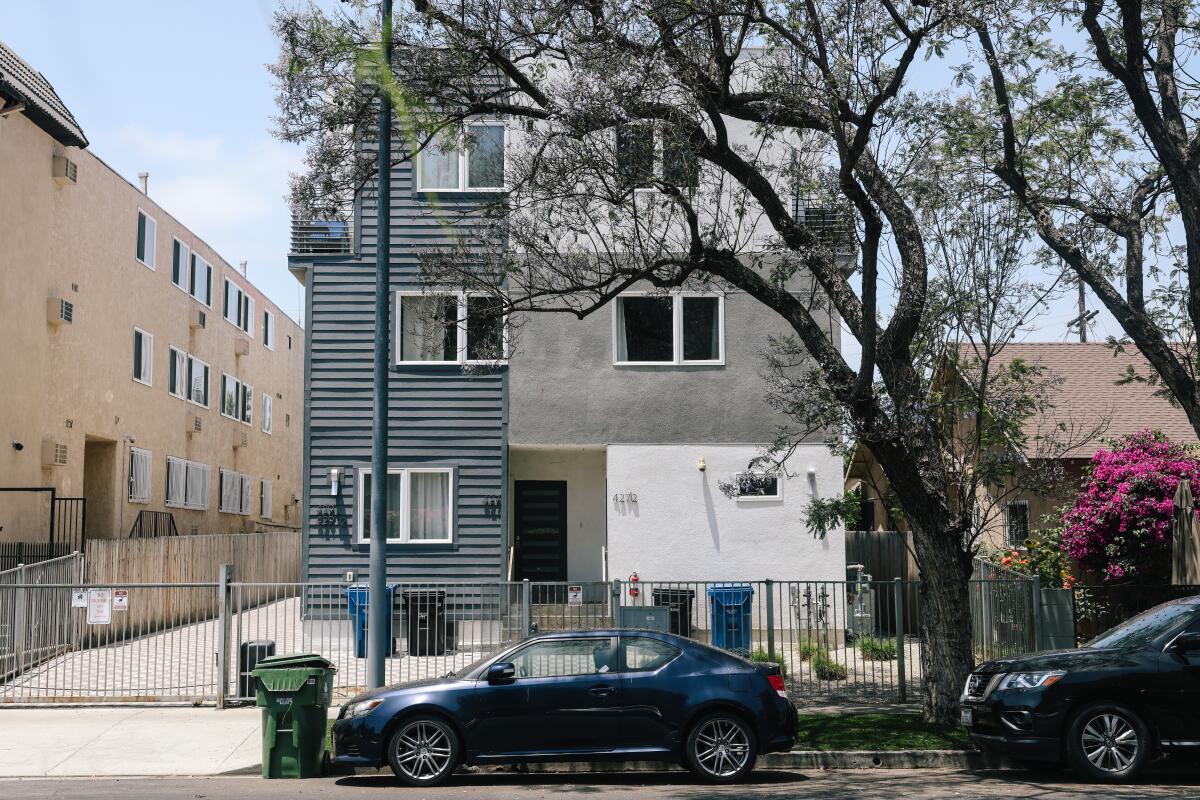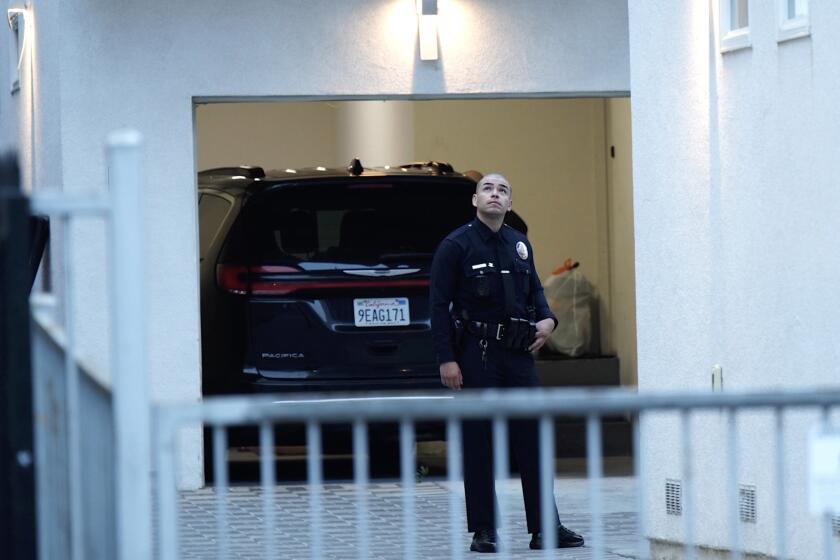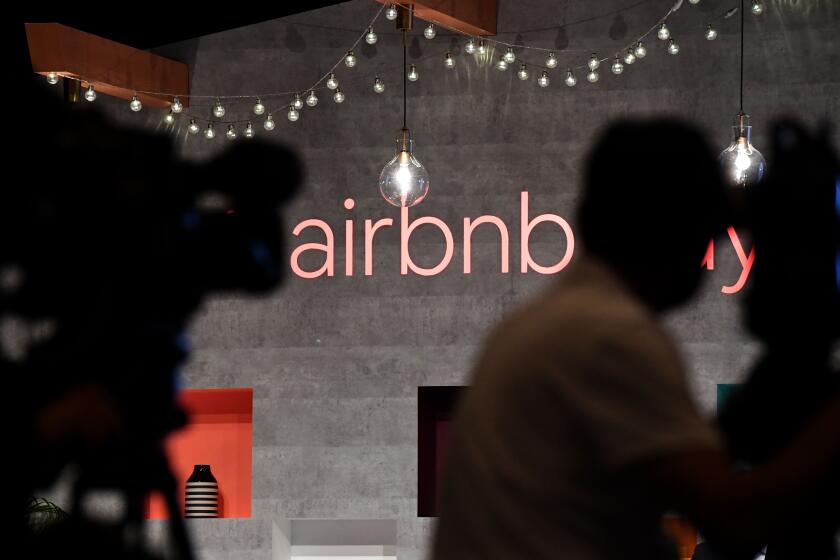Tourists were zip-tied and robbed in an L.A. short-term rental. Should it even have been open?

The site of an armed home invasion in East Hollywood where six tourists were zip-tied and robbed was listed on Airbnb and other sites in apparent violation of the city’s short-term rental ordinance, according to public records.
On June 4, a caller summoned officers to the 400 block of North Heliotrope Drive to report a robbery. There, the occupants told police that five men wearing ski masks and dark clothing had entered the residence armed with rifles and handguns, robbed them and fled before police arrived, according to Los Angeles Police Department Officer David Cuellar.
The person who called police said they were with their family and staying at an Airbnb, Cuellar said. The thieves stole cash from the victims, zip-tied them and taped their mouths shut, Cuellar said. No one was injured and no one had been arrested in the case as of Tuesday.
The armed robbery took place at 429 North Heliotrope Drive, according to news video of police officers at the property. The Heliotrope building, which contains four units, is rent-controlled under Los Angeles’ Rent Stabilization Ordinance, according to the city’s Zone Information and Map Access System, which provides zoning information for properties. That means the building can’t be used as a short-term rental under city rules, nor can any of its units be rented for 30 days or less.
The city’s Home-Sharing Ordinance dictates that hosts for short-term rentals must be registered with the city’s Planning Department, have paid the necessary fees and register only their primary residence, where they live for more than six months out of the year.
Los Angeles police are looking for five people who broke into an East Hollywood home, zip-tied the people inside and robbed them.
According to the ordinance, hosts can list only one unit at a time as a short-term rental and are prohibited from listing units that are rent-controlled, have been removed from the long-term market because of the Ellis Act or qualify for affordable housing covenants. The ban also extends to accessory dwelling units built in Los Angeles after 2016.
Temitayo “Timmy” Gidado was named on three short-term rental sites as the host of the four units at the North Heliotrope property, with Abby Blise listed as a co-host on Airbnb. The listings displayed registration numbers that belonged to a different property, and the hosts did not make the North Heliotrope property their primary residence, in violation of the ordinance, according to L.A. public records. The pair operate a rental management company, called Tag Group, that includes photos of what appears to be the North Heliotrope building on its website.
Blise and Gidado didn’t respond immediately to The Times’ requests for comment. The city’s Planning Department referred media inquiries to the LAPD.
A spokesperson for Airbnb said the robbery “has no connection to Airbnb — the property in question had not been booked out on our platform at the time that incident happened.”
Blise and Gidado listed units in the Heliotrope property at least three times on Airbnb, once on Booking.com and once on VRBO. All of the listings display registration numbers that belong to another property about one mile away at 953 N. Normandie Ave., according to the city’s Home-Sharing Public Records Portal. As of Wednesday, all of the Airbnb listings had been removed.
VRBO and Booking.com could not be reached immediately for comment.
For the last year, Nikeeta Sriram says she has watched helplessly as her tenant turned her L.A. home into a lucrative Airbnb against her will.
The registration numbers for 953 N. Normandie Ave. aren’t under Blise and Gidado’s names, according to the records portal. Together, Blise and Gidado have 22 Airbnb listings across Los Angeles.
Better Neighbors, a coalition of workers, businesses and housing advocates that formed in 2020, provides city officials and regulators with data and recommendations to toughen enforcement of the city’s Home-Sharing Ordinance, which was adopted by the City Council in December 2018. The group seeks to crack down on short-term rentals that don’t comply with L.A. rules.
Despite these restrictions, hosts regularly flout the rules. According to an analysis of Airbnb and registration data by Better Neighbors, about 34%, or 1,369, of 4,013 Airbnb listings on an average month between November 2021 and October 2022 didn’t comply with the Home-Sharing Ordinance.
“The rent control one is black-and-white,” said Randy Renick, an attorney with Hadsell Stormer Renick & Dai and executive director of Better Neighbors. “If it’s rent-controlled, it cannot be a short-term rental.”
On Tuesday, Renick presented the city with findings on the property on North Heliotrope Drive, requesting that the Planning Department investigate the rentals and impose fines on the hosts for allegedly violating the ordinance.
Crimes that take place at Airbnb rentals, Renick said, tend to happen at ones that are not the listing person’s primary residence and are illegally listed. He cited a 2022 ambush shooting at a house party in Inglewood, which killed four people and reportedly took place at an Airbnb that did not comply with local rules. Two people were also shot earlier this year during a Super Bowl party at a Hollywood Hills mansion.
The ordinance, five years in the making, would prohibit hosts to list second homes, accessory dwelling units or investment properties in unincorporated L.A. County.
In 2022, Airbnb banned all parties and events at its rentals, but critics say enforcement has been spotty.
“You essentially have a chaperone in a hosted unit, which makes things a lot safer,” Renick said. “The other shootings have gone down at party houses.”
Researchers have found that short-term rentals have taken 2,500 homes off the rental market in Los Angeles and increased rents $810 per year for the average L.A. household. They’re also responsible for more people becoming homeless in L.A. each night.
More to Read
Sign up for Essential California
The most important California stories and recommendations in your inbox every morning.
You may occasionally receive promotional content from the Los Angeles Times.














